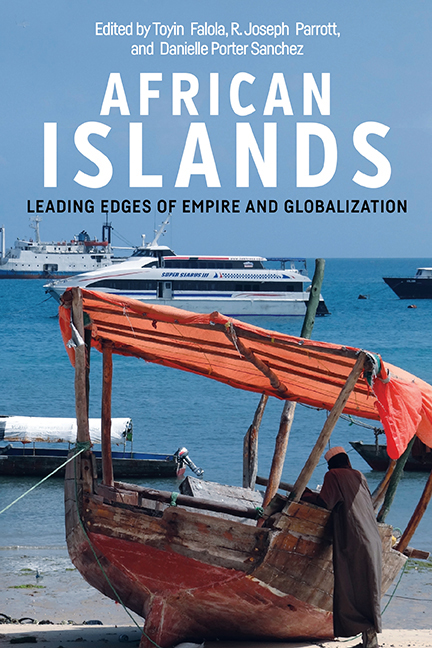Book contents
- Frontmatter
- Dedication
- Contents
- Introduction: Arbiters and Witnesses of Change: Contextualizing Conversations on African Islands
- Part 1 Atlantic Ocean Islands
- Part 2 Indian Ocean Islands
- 8 Africa's Indian Ocean Islands, Near and Distant
- 9 Monsoon Metropolis: Migration, Mobility, and Mediation in the Western Indian Ocean
- 10 The Mascarenes, Indian Ocean Africa, and Global Labor Migration during the Eighteenth and Nineteenth Centuries
- 11 The Island as Nexus: Zanzibar in the Nineteenth Century
- 12 Slavery and Postslavery in Madagascar: An Overview
- 13 The Comoros: Strategies of Islandness in the Indian Ocean
- 14 Gendered Pioneers from Mayotte: An Ethnographic Perspective on Travel and Transformation in the Western Indian Ocean
- Notes on Contributors
- Index
13 - The Comoros: Strategies of Islandness in the Indian Ocean
from Part 2 - Indian Ocean Islands
Published online by Cambridge University Press: 31 August 2019
- Frontmatter
- Dedication
- Contents
- Introduction: Arbiters and Witnesses of Change: Contextualizing Conversations on African Islands
- Part 1 Atlantic Ocean Islands
- Part 2 Indian Ocean Islands
- 8 Africa's Indian Ocean Islands, Near and Distant
- 9 Monsoon Metropolis: Migration, Mobility, and Mediation in the Western Indian Ocean
- 10 The Mascarenes, Indian Ocean Africa, and Global Labor Migration during the Eighteenth and Nineteenth Centuries
- 11 The Island as Nexus: Zanzibar in the Nineteenth Century
- 12 Slavery and Postslavery in Madagascar: An Overview
- 13 The Comoros: Strategies of Islandness in the Indian Ocean
- 14 Gendered Pioneers from Mayotte: An Ethnographic Perspective on Travel and Transformation in the Western Indian Ocean
- Notes on Contributors
- Index
Summary
The Comoros and Islandness
In the first issue of the Island Studies Journal, in a discussion of the possibility of developing a coherent theory of island studies, Pete Hay cites Jean-Didier Hache, who asks, in a somewhat doubtful take on island studies, “whether islands have anything in common besides their watery surroundings.” Slightly curiously, Hay did not develop this line of thinking in that particular article, but instead went on to express similar doubts about some of the currents in nissology at the time, concluding with a plea for a phenomenological approach to island studies. This seemed an eminently logical response to the enormous differences in sizes, populations, economies, political systems, cultures, in general, the astonishing diversity of islands that risked rendering an “island studies” paradigm somewhat hollow: what can usefully be said about Manhattan, Iceland, and Bermuda that constitutes them as members of a group that has commonalities and that is qualitatively different from another group that includes places such as São Paolo, Kamchatka, and Gibraltar? There seems to be very little that islands have in common that “mainlands” (and here too, there are problems of definition: are large islands such as Great Britain “mainlands” to their smaller companions?) do not share; and as if this were not enough, the extension—and metaphorization—of the concept of island to desert oases, cities, villages in the rainforest, seemed to render impossible any coherent and cohesive theoretical approach to island studies.
Various attempts have been made to resolve the dilemma by stressing the power relations pertaining between islands and mainlands, by inscribing analyses within the context of postcolonial studies, or by emphasizing the shore and the bounded character of islands (thus differentiating them from oases, for example). These approaches have had some success in analytical terms, but still have not coalesced as “island studies” in any satisfactory fashion.4 For example, many islands have indeed been colonized and dominated, but so, too, have they themselves colonized and dominated, for example, British islanders on the African or Asian mainland, or Japan in Korea.
- Type
- Chapter
- Information
- African IslandsLeading Edges of Empire and Globalization, pp. 370 - 396Publisher: Boydell & BrewerPrint publication year: 2019



